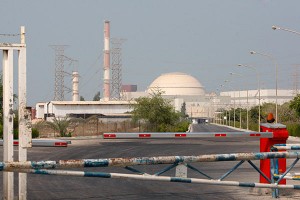 Tomorrow's 'technical-level' meeting in�Istanbul will give a quieter, closed-door venue for six world powers and Iran to try to turn diplomatic progress into concrete measures.
Tomorrow's 'technical-level' meeting in�Istanbul will give a quieter, closed-door venue for six world powers and Iran to try to turn diplomatic progress into concrete measures.Experts of Iran and six world powers will meet behind closed doors in Istanbul tomorrow for �technical-level� nuclear talks aimed at turning recent diplomatic progress into concrete measures.
Diplomats on both sides say the low-profile technical meeting can be ideal for thrashing out details and a timeline for the first steps to limit Iran�s most sensitive nuclear work, ahead of a fifth round of top-level nuclear talks in early April.
The technical meeting comes as President Barack Obama travels this week to the Middle East, where Iran�s nuclear program � and Israel�s consideration of any future Iranian nuclear weapon to be an �existential threat� � will be high on the agenda.
On the table in Istanbul will be a revised proposal by the six world powers that requires Iran to �suspend� but not permanently halt its 20-percent uranium enrichment, and to disable work at the deeply buried Fordow facility, in exchange for modest relief from sanctions.
That offer was put to Iran in Almaty, Kazakhstan, late last month, and is an easing of a first proposal � described at the time as �maximalist� by Western diplomats � put to Iran last spring.
The easing of demands has been hailed by Iran as a potential��change of strategy� and �turning point��conceded by the P5+1 group (the US, Russia, China, Britain, France, and Germany), which Iran argues amounted to recognition that it would not cave in to crippling sanctions.
Breakthroughs not just in big meetings
Beyond the glare of the spotlight that accompanies each full round of nuclear talks, the technical meeting can yield real results. After the last such Istanbul technical meeting in July, for example � despite three failed previous rounds of political talks in Istanbul, Baghdad, and Moscow last spring ��Iran for the first time formally said�its 20-percent enrichment was up for negotiation.
This time, the P5+1 will be looking for signs that Iran is willing to begin to physically curb that level of enrichment, in exchange for a specified timetable to ease some of the sanctions that have choked Iran�s economy.
�The regime is in some ways cautious, but has also made a lot of mistakes because it has invited so much pressure on itself,� says Alireza Nader, an Iran analyst at the RAND Corporation in Washington.
President Mahmoud Ahmadinejad�s frequent anti-Israel statements and denial of the Holocaust, especially, have done �tremendous damage� by adding impetus to the Western push for sanctions, which has even prompted criticism by Iran�s former nuclear negotiators and senior diplomats, says Mr. Nader.
Iran�s Supreme Leader Ayatollah Ali Khamenei said last week: �To put the honesty of the Western states to [the] test, we must wait until the next meeting with the P5+1 group.�
For Khamenei, talks part of rivalry
In the Almaty meeting, Mr. Khamenei said, the P5+1 �did nothing important which can be considered giving concession to Iran, but they only owned up to a small part of the rights of the Iranian nation.�
Nader says it can be argued that��Khamenei sees this as his legacy, not just having a nuclear weapons capability, but in beating the West at this game, because that�s what he sees it as: competition between the two sides, which is embedded in Iran�s concept of strategic rivalry with the United States."
Catherine Ashton, the European Union foreign policy chief who leads negotiations on behalf of the P5+1, on Saturday called on Western negotiators to be �determined and creative� in finding ways to build �trust� with Iran, to encourage further �real discussion.�
But the optics of success for both sides depend upon how they can present them back home. Senior US officials say the fundamentals of their package have not changed and do not amount to �concessions� to Iran. Many in the US Congress want sanctions increased, regardless of what steps Iran takes short of giving up its nuclear program altogether.
For Iran, it has been critical to present the adjusted P5+1 proposal as the result of a new realization by the P5+1 that sanctions and pressure are pointless � and that its own unbending stance has paid off.
�While everybody expected Iran to first change its strategic calculations and then its proposal, it was the West which finally changed its proposal,� wrote Mahdi Mohammadi, a former political editor of Iran�s hardline Kayhan newspaper now attached to Iran�s nuclear negotiating team, in a March 7 analysis.
�I believe that an important mental shift has occurred in the minds of US statesmen about the definition of a nuclear Iran,� writes Mr. Mohammadi on the Iran Review website.
Past rhetoric repeated
Still, ahead of the Istanbul talks, both sides repeated past rhetoric. President Barack Obama told Israeli television last week that a nuclear Iran was a �red line� for the US, and that Iran was just �over a year or so� from making a nuclear weapon, if it chose to. Iran officially rejects nuclear weapons, with Khamenei frequently saying they are "sin" and un-Islamic.
Likewise, an Iranian Revolutionary Guard commander, Brig. Gen. Masoud Jazayeri, on Saturday deliberately echoed a common formulation by US and Israeli officials.
�Mr. Obama, do not make a mistake: We have all our options on the table,� said General Jazayeri, according to a Guard website. �Our commanders have been authorized to respond to any kind of hostile move by the enemy.�
Last Thursday, the head of Israel�s military intelligence, Maj. Gen. Amir Kochavi, stated that Iran was making progress on its nuclear program, but �has not yet decided to build a bomb.� That also remains the prevailing assessment of US intelligence agencies.
By The Christian Science Monitor
The Iran Project is not responsible for the content of quoted articles.










